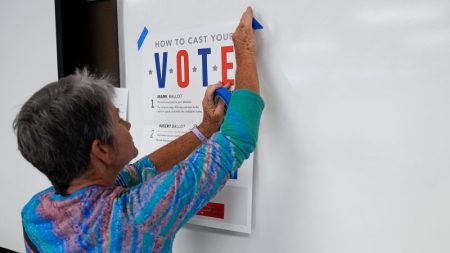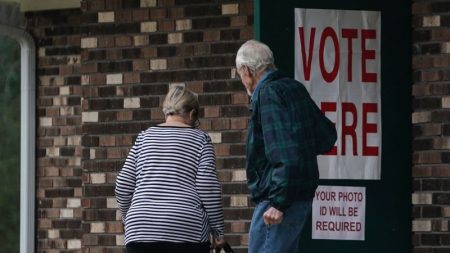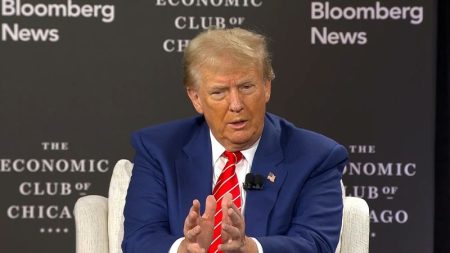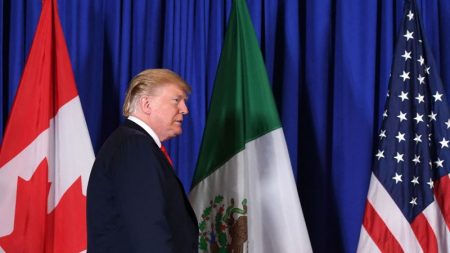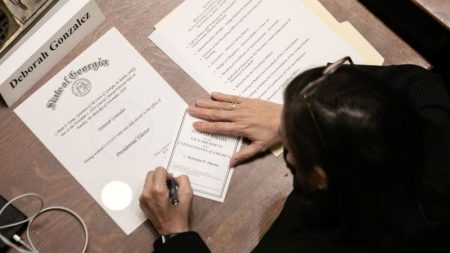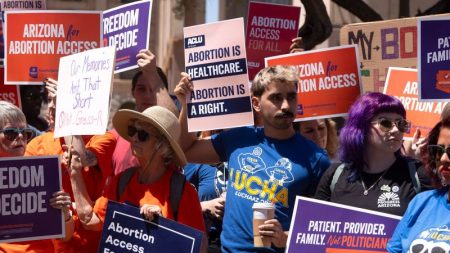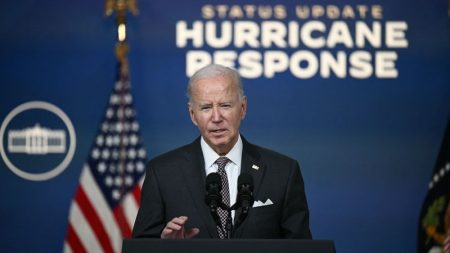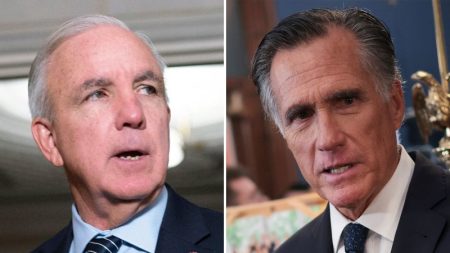Joe Manchin is going home to the place he belongs.
But the West Virginia senator’s Thursday announcement that he won’t seek reelection next year only refreshed a perennial question arising from his savvy instinct for accumulating power: What exactly is he up to?
Manchin’s departure will relieve one headache for those Democrats who were driven to distraction by his blockading and filleting of sweeping progressive legislation, including on issues like climate change.
But it will cause his party others. First, it could make Democrats’ already-tenuous hold on the Senate even shakier. Second, the announcement immediately stoked speculation that Manchin is mulling a third-party presidential bid.
Manchin’s decision to quit Washington comes as a formidable potential Republican challenger, West Virginia Gov. Jim Justice, leads in both primary and general-election polls. If the GOP captures the seat, it will complete the Mountain State’s total political transformation from one of the deepest-blue bastions in the union into one of the reddest and push a once-thriving species of conservative rural-state Democrats closer to extinction.
Manchin’s decision likely reflects a view that he won’t be able to secure reelection. And if Manchin can’t win in the MAGA stronghold of West Virginia, it’s impossible to believe any other Democrat can.
Liberals might disdain him, but Manchin’s victory by less than 20,000 votes in 2018 in a state where President Donald Trump won every county in a near-40-point romp two years later helped hand Democrats tiny recent Senate majorities.
With Manchin gone after the 2024 election, the Democrats’ current 51-49 Senate majority looks even more dicey. The party was already going to have to defend vulnerable seats in red states like Montana and Ohio to stay in power.
Manchin is also causing new conniptions inside a White House with which he’s long had testy relations. He accused White House staffers of saying “inexcusable” things when he helped collapse a huge climate and social policy bill in 2021.
In his announcement on Thursday, Manchin said he’d be “traveling the country and speaking out, to see if there is an interest in creating a movement to mobilize the middle, and bring Americans together.”
Manchin chooses his words carefully and knew full well this sentence would set off a cascade of speculation about a possible third-party presidential bid — especially since he’s associated himself with the No Labels group that is considering backing an independent run. As he has so often done in the Senate, Manchin appeared to be stoking ambiguity and intrigue designed to return him to the center of the spotlight in the way that replenishes his unique brand of political influence.
With President Joe Biden deeply unpopular and facing a cliffhanger reelection race, likely against a foe also craving a second term — Trump — a third-party ticket that peels away even a few votes in swing states could be disastrous for Democrats.
Manchin jolted Democrats in July when he traveled to New Hampshire to take part in the launch of a No Labels “common sense” platform on immigration, health care, gun control and the economy. He built anticipation for his visit by telling CNN’s Manu Raju at the time that “I’ve never ruled out anything or ruled in anything” and dodged questions over whether an independent presidential ticket could seriously hurt Biden in any race against Trump.
Even before Manchin’s Thursday announcement, the chances of a volatile election that could scramble the two-party calculus were rising. Robert F. Kennedy Jr. shelved a run for the Democratic nomination last month and announced his own independent run for president. Former Harvard professor Cornel West has already declared his independent bid. On Thursday, Jill Stein, who many Democrats blame for taking votes from Democratic nominee Hillary Clinton in 2016 and opening the door for Trump, said she’d seek the Green Party nomination.
Critics of third-party presidential campaigns often decry them as ego trips from candidates who have no chance of victory but who can siphon away sufficient votes in battlegrounds to have an outsize impact on who becomes president.
In a year when polls show that voters are deeply disdainful of both Trump and Biden, the temptation for third-party candidates is especially high.
“The idea that you could have a wild, wild West presidential campaign with numerous independents if they can solve the ballot access issues really could be problematic for Biden and Trump,” said Scott Jennings, a CNN political commentator. “Americans don’t want that rematch and they may be looking for a third, fourth, fifth door.”
Political analysts on the left worry that third-party candidates will take more votes from Biden than Trump, and they especially fret about a potential Manchin run.
“Joe Manchin is a Democrat, has been a Democrat all his life,” said David Axelrod, a former senior aide to President Barack Obama and CNN senior political commentator. “I think it would be very troublesome for the president if he were there,” Axelrod said, arguing that third-party candidates would lower the vote threshold Trump needs to win the White House.
There is little doubt that Manchin, a former state legislator and West Virginia governor, is frustrated with the vicious nature of polarized modern politics and the destruction of cross-party searches for consensus in the vanishing American political center. “Every incentive in Washington is designed to make our politics extreme,” he said Thursday. “The growing divide between Democrats and Republicans is paralyzing Congress and worsening our nation’s problems. The majority of Americans are just plain worn out.”
Manchin would like the attention that a spot on a third-party ticket would bring his attempt to save the nation from its poisoned politics. But after spending increasingly lonely years as a Democrat resisting a Republican tide in his home state, and after a proud career of statewide and national leadership, would Manchin really risk his political legacy on a final act that opened the Oval Office again to Trump?
Democratic Sen. Mark Warner of Virginia doesn’t think so. He told CNN’s Wolf Blitzer on Thursday: ”I cannot imagine a world in which Joe Manchin would do anything to help Donald Trump get elected.”
Manchin, who has often mythologized his hometown of Farmington, credits his relationships with West Virginians of all political stripes for a political approach that has frequently seen him break with Democrats to thwart progressive legislation, often in support of his state’s dwindling carbon industries. It would be hard to find a senator more protective of his constituents, more deeply aware of the tough economic and social forces like deindustrialization and opioid abuse that have ravaged Appalachia, or more devoted to the old-school lawmaker’s practice of unapologetically directing federal cash back to his state. This last attribute was inherited from his mentor Robert Byrd, whose seat Manchin filled in 2010 after the death of the veteran Democratic senator.
“He did have a good pulse on his constituency, not that he didn’t alienate some people on the left, which is a declining portion of the population here,” said John Kilwein, associate professor and chair of the department of political science at West Virginia University. “But he knew what he was doing, he got on the national shows … and presented himself as this commonsense, conservative Democrat and that played well at home.”
In the Senate, Manchin pursued an idea of civility and cooperation that long seemed an anachronism — even before Trump inspired a new wave of Republican senators who are keener on thwarting governance than legislating.
Ironically, given that he’s been so disruptive to elements of Biden’s domestic agenda, Manchin’s nostalgia for the old ways actually mirrors the president’s traditional view of how Washington should work. His influence hit a peak in the first two years of Biden’s term, when Democrats had a 50-50 Senate majority and Manchin had an effective veto on the president’s bills. His reluctance to support far-reaching progressive goals led to the scaling back of vital elements of Biden’s agenda, including on climate change. This and his refusal to contemplate abolishing the Senate filibuster to pass a massive voting-rights reform measure made him a pariah among left-wing Democrats.
As Manchin and a fellow moderate Arizona Sen. Kyrsten Sinema negotiated with the White House and progressive Democrats under massive pressure, crowds of reporters would trail Manchin through the Capitol hanging on his every word. Reports about Manchin’s meetings at his houseboat moored in Washington with fellow lawmakers only increased the intrigue. At one point, a bunch of kayaking protesters surrounded Manchin’s vessel, “Almost Heaven” — named for lyrics in John Denver’s classic song about Manchin’s beloved home state. Manchin leaned over the stern in his dress shirt and explained why he wasn’t signing up to the president’s budget reconciliation bill packed with social and climate spending.
In the end, however, Manchin backed the smaller Inflation Reduction Act which he had a hand in writing; and Biden’s bipartisan infrastructure law, which may have fallen short of original Democratic goals but which will shape the US economy and environment for decades to come and dominate the president’s legacy.
Manchin’s farewell to the Senate after the next election will reinforce a trend that has seen rural states turn almost exclusively to the Republican Party, which in the Trump era has become more blue-collar in nature. Democrats now seek their power bases in nations vast cities and suburbs.
West Virginia was once a Democratic bastion, however. In 1960, it handed John Kennedy a primary victory after a frenzied cross-state campaign that he credited with paving the way to the White House and ended fears that anti-Catholic bigotry could end his presidential hopes. The last Democrat to win the state in a presidential election was President Bill Clinton in his 1996 landslide. Democratic nominees now don’t even bother to visit the state, though it was the venue for some bitter late-primary campaign action between Hillary Clinton and Barack Obama in 2008.
Republicans are sure to secure West Virginia’s four electoral votes in 2024, and the state is almost certain to send a GOP senator to Washington in Manchin’s place. The state has “moved to the right, and this is just another manifestation of that,” Kilwein said. “It’s the end of an era.”
Read the full article here




